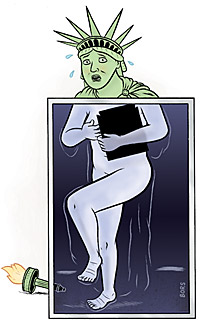
The Transportation Security Administration’s (TSA) even-more-invasive pat-down searches for people who opt-out of the strip-search machines at airports have generated some striking stories of people’s encounters with TSA agents. Jeffrey Goldberg of The Atlantic recounts:
At BWI, I told the officer who directed me to the back-scatter that I preferred a pat-down. I did this in order to see how effective the manual search would be. When I made this request, a number of TSA officers, to my surprise, began laughing. I asked why. One of them — the one who would eventually conduct my pat-down — said that the rules were changing shortly, and that I would soon understand why the back-scatter was preferable to the manual search. I asked him if the new guidelines included a cavity search. “No way. You think Congress would allow that?”
I answered, “If you’re a terrorist, you’re going to hide your weapons in your anus or your vagina.” He blushed when I said “vagina.”
“Yes, but starting tomorrow, we’re going to start searching your crotchal area” — this is the word he used, “crotchal” — and you’re not going to like it.”
“What am I not going to like?” I asked.
“We have to search up your thighs and between your legs until we meet resistance,” he explained.
“Resistance?” I asked.
“Your testicles,” he explained.
The New York Times‘ Joe Sharkey was manhandled less delicately: “[I] was required to stand still while I received a rough pat-down by a man whose résumé, I suspected, included experience at a state prison.”
Another passenger gives an even more graphic description of his humiliating and invasive pat-down here:
He stood behind me and placed his arms around my neck, surprising me with how strong and firm his grip was — it felt like someone choking me from behind. He squeezed the area around my collar, his neoprene blue gloved hands tickling my ears. And he kneaded around my shoulders, pressing with his fingertips into my muscle, as if he were tenderizing a piece of meat. With my arms held out straight he grasped both his hands around each one and pulled all the way down to my wrist.
Unfortunately, the TSA’s escalation from a back-of-the-hands pat-down to a full-on grope is no laughing matter — in fact, they tried to make a more invasive grope the norm back in 2004, until travelers pushed back and the TSA quietly retreated back to lighter touch.
Travelers have the right to opt for a pat-down instead of exposing themselves to the radiation and prying eyes of an anonymous TSA agent in another room. But as ACLU Legislative Counsel Chris Calabrese told USA Today: “Are we giving people two intolerable actions at airports? They can be virtually strip-searched or endure a really aggressive grope?”
That’s exactly what the TSA is doing, in its latest bit of security theater designed to try to make us feel safer without actually increasing safety. And it’s really no choice at all. As Goldberg points out, “the effectiveness of pat-downs does not matter very much, because the obvious goal of the TSA is to make the pat-down embarrassing enough for the average passenger that the vast majority of people will choose high-tech humiliation over the low-tech ball check.” In fact, Goldberg reports that he was told directly by a screener, “That’s what we’re hoping for. We’re trying to get everyone into the machine.”
The TSA’s website reports that 317 strip-search machines (a.k.a. “advanced image technology” machines, or AITs) have been deployed at 65 airports across the country. Is your home airport one of them? Check this list, and if you’re of the male persuasion and not keen on the naked machine, we suggest you prepare The Resistance.
If you’ve been forced through an AIT or want to report abuse during airport passenger screening, contact us using this form. We’re collecting individuals’ stories in order to determine the scope of this problem and evaluate future action. The information you provide in this questionnaire will be kept confidential unless we contact you and obtain your permission to share it with others.


